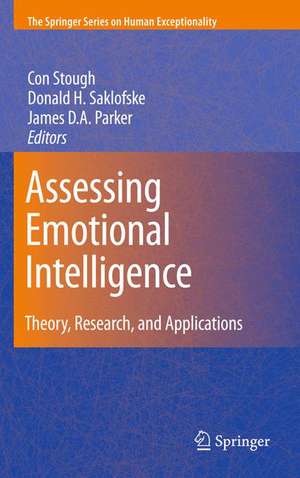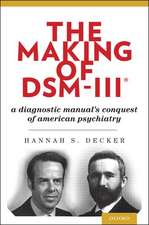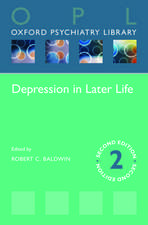Assessing Emotional Intelligence: Theory, Research, and Applications: The Springer Series on Human Exceptionality
Editat de Con Stough, Donald H. Saklofske, James D. A. Parkeren Limba Engleză Hardback – 27 mai 2009
This volume demonstrates the study and application of EI across disciplines, ranging from psychometrics and neurobiology to education and industry. Assessing Emotional Intelligence carefully critiques the key measurement issues in EI, and leading experts present EI as eminently practical and thoroughly contemporary as they offer the latest findings on:
- EI instruments, including the EQ-I, MSCEIT, TEIQue, Genos Emotional Intelligence Inventory, and the Assessing Emotions Scale.
- The role of EI across clinical disorders.
- Training professionals and staff to apply EI in the workplace.
- Relationships between EI and educational outcomes.
- Uses of EI in sports psychology.
- The cross-cultural relevance of EI.
| Toate formatele și edițiile | Preț | Express |
|---|---|---|
| Paperback (1) | 948.29 lei 6-8 săpt. | |
| Springer Us – 8 dec 2010 | 948.29 lei 6-8 săpt. | |
| Hardback (1) | 954.62 lei 6-8 săpt. | |
| Springer Us – 27 mai 2009 | 954.62 lei 6-8 săpt. |
Din seria The Springer Series on Human Exceptionality
- 18%
 Preț: 1013.96 lei
Preț: 1013.96 lei - 15%
 Preț: 645.14 lei
Preț: 645.14 lei - 18%
 Preț: 976.54 lei
Preț: 976.54 lei - 5%
 Preț: 718.10 lei
Preț: 718.10 lei -
 Preț: 384.48 lei
Preț: 384.48 lei - 15%
 Preț: 645.79 lei
Preț: 645.79 lei - 5%
 Preț: 608.75 lei
Preț: 608.75 lei -
 Preț: 390.46 lei
Preț: 390.46 lei - 18%
 Preț: 998.79 lei
Preț: 998.79 lei -
 Preț: 386.99 lei
Preț: 386.99 lei - 18%
 Preț: 900.29 lei
Preț: 900.29 lei - 20%
 Preț: 552.13 lei
Preț: 552.13 lei - 15%
 Preț: 533.72 lei
Preț: 533.72 lei - 18%
 Preț: 1404.15 lei
Preț: 1404.15 lei - 18%
 Preț: 1115.63 lei
Preț: 1115.63 lei - 15%
 Preț: 643.48 lei
Preț: 643.48 lei - 18%
 Preț: 1123.04 lei
Preț: 1123.04 lei
Preț: 954.62 lei
Preț vechi: 1164.17 lei
-18% Nou
Puncte Express: 1432
Preț estimativ în valută:
182.67€ • 195.33$ • 152.30£
182.67€ • 195.33$ • 152.30£
Carte tipărită la comandă
Livrare economică 17 aprilie-01 mai
Preluare comenzi: 021 569.72.76
Specificații
ISBN-13: 9780387883694
ISBN-10: 038788369X
Pagini: 364
Ilustrații: XII, 364 p.
Dimensiuni: 155 x 235 x 22 mm
Greutate: 0.71 kg
Ediția:2009
Editura: Springer Us
Colecția Springer
Seria The Springer Series on Human Exceptionality
Locul publicării:New York, NY, United States
ISBN-10: 038788369X
Pagini: 364
Ilustrații: XII, 364 p.
Dimensiuni: 155 x 235 x 22 mm
Greutate: 0.71 kg
Ediția:2009
Editura: Springer Us
Colecția Springer
Seria The Springer Series on Human Exceptionality
Locul publicării:New York, NY, United States
Public țintă
ResearchCuprins
Section 1: Some theoretical thoughts on EI.- A Brief Analysis of 20 Years of Emotional Intelligence: An Introduction to Assessing Emotional Intelligence: Theory, Research, and Applications.- Psychometrics and the Measurement of Emotional Intelligence.- Section 2 Research on measures of EI.- An Ability Model of Emotional Intelligence: A Rationale, Description, and Application of the Mayer Salovey Caruso Emotional Intelligence Test (MSCEIT).- Assessing Emotional Intelligence Using the Emotional Quotient Inventory (EQ-i) and Related Instruments.- Psychometric Properties of the Trait Emotional Intelligence Questionnaire (TEIQue).- The Genos Emotional Intelligence Inventory: A Measure Designed Specifically for Workplace Applications.- The Assessing Emotions Scale.- Section 3 Applying EI research.- The Importance and Training of Emotional Intelligence at Work.- Performance Based Measures and Practical Validity.- The Application of Emotional Intelligence in Industrial and Organizational Psychology.- Emotional Intelligence and Physical Health.- Emotional Intelligence and Clinical Disorders.- The Role of Emotional Intelligence in Education.- Section 4: New Directions and Conclusions.- Emotional Intelligence Across Cultures: Theoretical and Methodological Considerations.- Emotional Intelligence in Sport: Theoretical Linkages and Preliminary Empirical Relationships from Basketball.- Understanding the Neurobiology of Emotional Intelligence: A Review.- New Directions and Alternative Approaches to the Measurement of Emotional Intelligence.
Notă biografică
Donald Saklofske, Ph.D., is a Professor in the Division of Applied Psychology at the University of Calgary. He is also an Adjunct Professor at the University of Saskatchewan and Swinburne University, Australia. He is a Fellow of the Canadian Psychological Association and the Association for Psychological Science. Dr. Saklofske has published more than 150 journal articles and book chapters on intelligence, personality, individual differences and psychological assessment. In addition, he has written or edited books on the Wechsler intelligence scales, personality and intelligence, exceptional children, and educational psychology. He is the Editor of the Journal of Psychoeducational Assessment and the Canadian Journal of School Psychology and Associate Editor of Personality and Individual Differences.
Con Stough, Ph.D., is a professor in cognitive neuroscience at Swinburne University, Australia.
Con Stough, Ph.D., is a professor in cognitive neuroscience at Swinburne University, Australia.
Textul de pe ultima copertă
Managing human emotions plays a critical role in everyday functioning. After years of lively debate on the significance and validity of its construct, emotional intelligence (EI) has generated a robust body of theories, research studies, and measures. Assessing Emotional Intelligence: Theory, Research, and Applications strengthens this theoretical and evidence base by addressing the most recent advances and emerging possibilities in EI assessment, research, and applications.
This volume demonstrates the study and application of EI across disciplines, ranging from psychometrics and neurobiology to education and industry. Assessing Emotional Intelligence carefully critiques the key measurement issues in EI, and leading experts present EI as eminently practical and thoroughly contemporary as they offer the latest findings on:
This volume demonstrates the study and application of EI across disciplines, ranging from psychometrics and neurobiology to education and industry. Assessing Emotional Intelligence carefully critiques the key measurement issues in EI, and leading experts present EI as eminently practical and thoroughly contemporary as they offer the latest findings on:
- EI instruments, including the EQ-I, MSCEIT, TEIQue, Genos Emotional Intelligence Inventory, and the Assessing Emotions Scale.
- The role of EI across clinical disorders.
- Training professionals and staff to apply EI in the workplace.
- Relationships between EI and educational outcomes.
- Uses of EI in sports psychology.
- The cross-cultural relevance of EI.
Caracteristici
Presents a rich treatment of EI measurement and assessment in various settings Critically reviews the major measurement issues in EI and explores future assessment techniques Provides an introduction, critique, and summary chapters to surround the chapters that describe specific scales Provides information that is of relevance across disciplines ranging from psychology to education and industry Includes supplementary material: sn.pub/extras













